Get Better Sleep
Sleep disorders can negatively affect your quality of life. Trouble sleeping can impact memory, reduce cognitive function, increase your risk for disease, and more. In order to get the sleep you need, you need to know why you are having trouble sleeping. The team at North Canyon’s Sleep Center in Twin Falls specializes in sleep disorders of all kinds. Their number one goal is to improve your quality of life by improving your quality of sleep.

Better Sleep = Better Health
There is no denying that good sleep contributes to a healthy body, but how much does sleep really matter? Contrary to what most people believe, sleep is not a passive process. Your brain requires sleep so that it can work in the background while your body rests. During sleep, your brain cycles through stages of activity that allow both your brain and your body to rejuvenate. When you don’t get the sleep you need, your brain and body suffer.
Quality sleep means your sleep is continuous and uninterrupted. However, sleep can be disrupted for many reasons. Poor sleep can be due to pain, medical problems, frequent urination, medications, poor or irregular sleep schedules, and sleep disorders.
Some medical conditions, like chronic pain, are made worse by undiagnosed sleep disorders. Better sleep may be your easiest, most natural, and least expensive route to better health. Our sleep center can help detect common sleep disorders.
Sleep Disorder Symptoms
Several symptoms may indicate you have a sleep disorder. If any of the following apply to you, you may need better sleep:
- Loud or disruptive snoring
- Snoring with pauses/gasping
- Daytime sleepiness
- Trouble concentrating
- Forgetfulness
- Depression
- Irritability
- Morning headaches
- Frequent nighttime urination
- Sexual dysfunction
Understanding Sleep Disorders
The best way to understand why you aren’t sleeping is by conducting a sleep study. Sleep studies monitor the activities in your body and brain during sleep, including brain waves, muscle movements, eye movements, breathing through your mouth and nose, snoring, heart rhythm, and blood oxygen levels. These can be conducted at our sleep center near Twin Falls.
Many people assume that poor sleep or problems staying asleep are related to stress. However, there are 81 known sleep disorders - ranging from snoring, sleep apnea, insomnia, sleep deprivation, and more - many of which have nothing to do with stress and all of which can lead to poor health.
If you suffer from non-restorative sleep, high or low blood pressure, weight problems, depression or another mood disorder, congestive heart failure, irregular heart rhythm, heartburn, or chronic pain, talk to us about getting a sleep study.
Do I Need a Sleep Study?
If two or more of the following statements are true for you, you may benefit from a sleep study:
-
I feel sleepy during the day, even when I get a good night’s sleep.
-
I get very irritable when I can’t sleep.
-
I often wake up at night and have trouble falling back to sleep.
-
It usually takes me a long time to fall asleep.
-
I often wake up very early and can’t fall back to sleep.
-
I usually feel achy and stiff when I wake up in the morning.
-
I often seem to wake up because of dreams.
-
I sometimes wake up gasping for breath.
-
A family member says my snoring keeps them from sleeping.
-
I’ve fallen asleep driving.
We Are Here to Help With Sleep Disorders
At North Canyon, our Sleep Center has been decorated to create a warm, relaxing atmosphere to ensure comfort. Each room is equipped with features similar to those in a bedroom, including a flat-screen television. Patients rest comfortably on an adjustable Select Comfort Bed. The Sleep Clinic also features state-of-the-art wireless technology, which eliminates the inconvenience of extensive wiring on you.
What If I Can't Sleep During A Sleep Study?
It's completely normal to feel apprehensive about being able to sleep in an unfamiliar environment, such as a sleep center. You might be worried that your anxiety about the sleep study will keep you awake. The good news is, our team at North Canyon's Sleep Center is prepared to assist you with this common concern.
Firstly, know that it's okay if you don't sleep as well as you normally do during the study. Our specialists can typically gather enough information from the time you do spend asleep to make a diagnosis. Even if you experience difficulty falling asleep or staying asleep, the data collected can still provide valuable insights about your sleep patterns and potential disturbances.
If you feel anxious about falling asleep, it may be beneficial to follow a calming bedtime routine in the hours leading up to your study. This can include activities like reading a book, listening to soft music, or practicing deep breathing exercises. Please communicate with our staff about any specific worries or needs you have. Our goal is to ensure your comfort and help you achieve the most accurate results from your study.
To ensure the most accurate results from your sleep study and make your experience as comfortable as possible, consider these preparation tips:
-
Maintain Your Routine: Stick to your usual daytime routine, including meals and physical activity. This helps ensure that your sleep patterns during the study are representative of your normal habits.
-
Avoid Napping and Stimulants: Try to avoid napping during the day of your sleep study. Also, refrain from consuming caffeine, alcohol, or any stimulants that might affect your sleep patterns.
-
Pack Like You're Spending the Night Away: Bring your own comfortable night clothes, and don't forget your personal toiletries. If you have a favorite pillow or blanket that helps you sleep better, feel free to bring that along too.
-
Medication and Medical Information: Bring a list of all the medications you're currently taking, including dosages and times. Don't forget to include over-the-counter medicines and supplements. If you take certain medications before bed, bring those with you to the sleep center.
-
Prepare for Bedtime: Engage in your usual relaxing bedtime routine to help signal your body it's time to sleep. This could be reading, meditating, or listening to soothing music.
